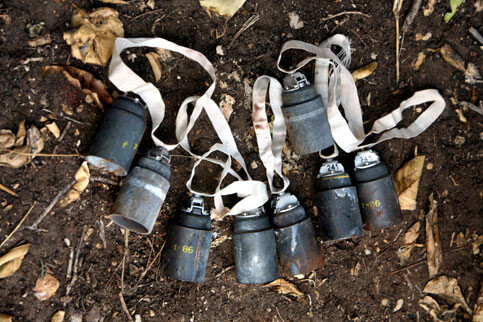IRIN 15 November 2006

Up to a million cluster bombs lie scattered in the fields of southern Lebanon. (Manoocher Deghati/IRIN)
ZAWTAR SHARQIYYE — Any other year, the olive harvest season would now be in full swing in Zawtar Sharqiyye, a village in southern Lebanon’s Nabatiyye region, where the majority of people make a living from farming olives and tobacco.
“This year, because of the cluster bombs, the olive harvest is lost,” said Riad Ali Ismail, head of the local municipality.
Three months after the 34-day war between Israel and Hezbollah ended, up to one million unexploded cluster bombs still lie scattered throughout southern Lebanon, according to United Nations agencies. The seemingly innocuous small bombs pose a deadly hazard to the population.
Ismail said olive farmers are among the worst affected by the conflict. “It was bad enough for us that many olive trees were destroyed in bombing during the war,” he said. “Now, facing existing losses, farmers either choose to stay out of danger but then make no money at all for their families, or to seriously risk their lives by trying to harvest what remains of the olives.”
In southern Lebanon, agriculture makes up at least 70 percent of the economy. In Zawtar Sharqiyye, Ismail said that the dependency on farming is even higher. “Ninety percent of families here rely directly on agriculture, while most of the remaining 10 percent have an indirect stake in it. Olive farming is, along with tobacco, the most critical crop for us.”
Among those taking life-threatening risks every day of the harvest in Zawtar Sharqiyye is Abu Mohamed, who did not want to reveal his full name. “What can I do? I have four young children and a wife to support. If I don’t go out into the fields to pick the olives, then who will feed us?” he said.
Despite concerted efforts by the government and NGOs to create awareness of the dangers that unexploded bombs pose, farming communities continue to put their lives in danger.
Abu Mohamed’s 11-year-old son, Mohamed, said he and a group of friends and relatives spend much of their free time playing in fields that are still contaminated. “We’re not afraid of the cluster bombs,” said Mohamed. “I’ve picked them up many times, nothing has ever happened. My father doesn’t say anything.”
Awareness campaigns are currently being conducted by the Lebanese government, international aid agencies and local civil society organisations and NGOs. Among the goals is to raise awareness among children in the south, by educating them, their teachers and social and health workers on the hazards of cluster bombs.
But Ismail said that more needed to be done to inform the local population against handling cluster bombs and that the war would not truly be over until all the bombs were gone.
“We haven’t seen any awareness work being done here, though the local population needs it,” he said. “With all the cluster bombs, the aftermath of the war has been more problematic and frightening than the war itself. We aren’t living in peace here, by no means.”
Israel dropped 3 million cluster bombs in southern Lebanon, according to UN estimates, of which around 1 million failed to explode. Israeli daily newspaper Haaretz reported on 14 November that the high failure rate of these cluster munitions was because “Israel opted for cheaper, unsafe cluster bombs”.
Unexploded cluster bombs have killed 22 people and injured 135 since the war ended on 14 August, according to the UN’s mine clearance agency, MACC. The agency said around 60,000 cluster bombs had been cleared so far.
As long as funding for clearance teams continues to be available, all the bombs will be cleared in 12 to 15 months, according to MACC media and post-clearance officer Dalya Farran.
This item comes to you via IRIN, a UN humanitarian news and information service, but may not necessarily reflect the views of the United Nations or its agencies. All IRIN material may be reposted or reprinted free-of-charge; refer to the copyright page for conditions of use. IRIN is a project of the UN Office for the Coordination of Humanitarian Affairs.
Related Links